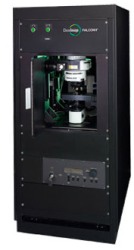Mar 19 2010
ChemImage, a world leader in chemical imaging products and services, will present the results of an ingredient-specific particle sizing (ISPST) study on a combination Metered Dose Inhaler product at Respiratory Drug Delivery (RDD) 2010.
 Raman Chemical Imaging System
Raman Chemical Imaging System
This conference will take place from April 25th - 29th in Orlando, Florida and will feature thought leaders discussing current biological and pharmaceutical issues related to nasal and respiratory drug delivery.
ChemImage researchers will present "Ingredient-Specific Particle Sizing of Combivent® Metered Dose Inhaler" in which results from a wide-field Raman Chemical Imaging study of drug particle size distribution of two active pharmaceutical ingredients (APIs) in a Metered Dose Inhaler (MDI) will be discussed.
"This study is meant to provide drug developers with guidance on how they can utilize a new analytical method to characterize an inhalation product with more than one active pharmaceutical ingredient," said Dr. Ryan Priore, Director of Applications and Contract Services. "This has historically been very difficult and time consuming with current methods such as cascade impaction and HPLC. Raman Chemical Imaging can provide a more efficient and accurate alternative for these combination products."
This novel approach to characterization of a combination drug product enables the identification of each API via a unique Raman signature and ingredient-specific particle sizing as a result of a chemical image analysis. This information can be especially useful during product development and formulation, providing valuable information about product quality and performance prior to entering into expensive clinical trials.
Wide-field Raman Chemical Imaging is a method that combines the capabilities of Raman spectroscopy and advanced digital imaging, detailing material morphology and composition with a high degree of specificity in a non-contact, non-destructive manner. ChemImage provides Raman Chemical Imaging contract services for pharmaceutical customers for characterization of nasal spray suspensions, metered dose inhalers, dry powder inhaler products and many other types of drug delivery systems. Studies can be performed on a contract basis for ingredient-specific particle size distribution, aggregation studies, polymorph identification, and stability studies as well as content uniformity and controlled release analysis.